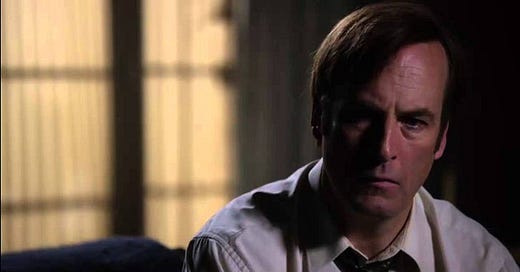You Need To See The Peekaboo Bird
Also the reluctant moral anchors of Better Call Saul, the romance of lies, and all these garbage cans that need knocking over
STICK TO BIRDS
Believe me when I tell you that you need to see the peekaboo bird, and you need to have the sound on. Your boss probably can’t hear you.
I don’t much trust birds, but I trust this one.
STICK TO TELEVISION
So, here’s the thing about Better Call Saul, the Breaking Bad prequel which just logged Episode 6 of Season 5 on Monday night. I don’t know if it’s better than its predecessor, and we’re at the point where it just doesn’t make much sense to compare the two anyway, as much as the characters and timelines are beginning to overlap. Creator Vince Gilligan loves his stories of personal transformation, and both qualify here, but the adrenaline is dialed way, way down, so is the body count, and what you’re left with is a show that remembers that simplicity doesn’t water down drama, it informs it.
I’ll operate under the assumption that if you know, you know—those already familiar with Saul don’t need my encouragement to keep watching. But maybe you’ve seen Breaking Bad. Maybe you haven’t. Maybe you’re like me and there aren’t many shows you jump in on before they’re done. Either way, it’s my favorite show on television, and if you’re not watching I think you’re missing a rare gem.
Title character Saul Goodman, played by Bob Odenkirk in a sorely overdue* feature opportunity, is first introduced as Jimmy McGill, a two-bit con artist and mail clerk at a law firm co-partnered by brother Chuck (Michael McKean). The contention between feckless Jimmy and spotless Chuck is played masterfully; each brother wants the other to come off his archetype, knowing full well they can’t, not long-term, not the way the other wants. For two titans of improv comedy, the tension and heartbreak they play off each other are so real, so genuine that the drama dominates the early going.
*Mr. Show With Bob & David premiered in November 1995. As in the 1995 that was 25 years ago.
It’s a stark contrast to the cascade of external roadblocks and MacGuffins that pervaded Breaking Bad, and a fresh breath of air—most viewers don’t have much experience mowing down neo-Nazis with a trunk-mounted M-60 machine gun, which is part of the allure of the main show, but we might see a little bit more of ourselves in characters who just want the validation of a healthy relationship with their sibling.
Simultaneously, we follow Mike Ehrmantraut, another Breaking Bad mainstay; Ehrmantraut is introduced as a parking lot attendant, ex-cop and goon for hire. Again, we know his story, and we know he gets involved as trusted muscle for big bad Gus Fring, but again, we don’t know how or when, and Jonathan Banks plays the role to gruff perfection. He has always been a man with a lot to hide, and when we see it, we get it.
These are two wildly disparate elements, at least in the early going, and with subpar writers or actors it would fall off the rails. But for all the fan service around familiar characters, the show thrives on two faces we’ve never seen before: budding drug runner Ignacio “Nacho” Varga (Michael Mando) and attorney Kim Wexler (Rhea Seehorn), Jimmy’s love interest. Both act as reluctant moral anchors of their respective halves of the world, and—crucially—both are written human enough to slough off the weight of the anchors and act in their self-interests when they think it matters.
Mando is excellent in his own right, though Nacho’s Wikipedia entry doesn’t inspire a ton of confidence in that fact:

It communicates a point, at least.
Most fans of the show will gravitate toward Kim, though, and for good reason. As a relatively fresh face to viewers, Rhea Seehorn is able to inhabit the character completely—more on that in a while—but as with any prequel, there’s always the effect that our advance knowledge has on us as viewers. We know Jimmy/Saul makes it through to Breaking Bad’s timeline. We know Mike’s dangers are only momentary. Whatever this show puts up, Gus is going to win. It’s still fun to see how and when.
Conversely, the characters that don’t make it through have this invisible pen of Damocles hanging over their heads, their fates likely decided by writers somewhere in the story before the show is through. And here is Kim Wexler, Jimmy’s/Saul’s last best hope for staying on something approaching an ethical path (this scenario brought to you by the letters L, O, and L).
Kim’s personal relationship with Jimmy (he’s only Saul during work hours) is only healthy when both are putting honest effort into it, and the way they both wander in and out of harmony with the other is a sight to behold—no, it’s literally a sight; the show is peppered with subtle visual cues for the characters’ mindsets. Here’s 13 minutes about one montage from last season. It’s worth it.
There’s an inner turbulence to Jimmy that Kim can’t and won’t dare match, but crucially, she comes to see not only the calculated benefits of Jimmy’s amorality but the romance behind it—that intoxicating taste of slipping out of one’s skin, just for a moment, to bend the arc of one’s little universe towards one’s own desires.
And Kim needs him for this. She can tell a hard, honest truth and it comes out like a lie; Jimmy can read you a heartbreaking poem and then turn around with a wink and show you a blank piece of paper. It’s not Adam feeding the apple to Eve—she’s a character of tremendous agency, and more on that in the side note below—but he is a singular, confounding, chaotic force that she can no more control than the Albuquerque winds, and it’s just as enthralling to watch Kim—and Seehorn—navigate these challenges as it is to watch Jimmy create them. For as much as Breaking Bad struggled hard with how to use its female characters, Wexler is a rock of Gibraltar, and it’s an actual felony crime that Seehorn hasn’t even been nominated for an Emmy in the role’s service.
SIDE NOTE: It’s borderline ridiculous that this needs to be mentioned, but Seehorn is 47, starting the role at 42, and her Kim Wexler is strong, capable, confident, and yet still allowed to be feminine and sexual while A) without being cartoonishly any of those, and more importantly B) without even a wink at being “incomplete” for not being a wife or a mother at this stage in her life or career. She’s Jimmy’s love interest, but she is never, ever the damsel. Salute.
The first four seasons are on Netflix, and you can catch up on this season through either your cable provider’s on-demand or on Amazon ($20 for the full season). I’m sure there are less legal ways to go about it too. And if you get caught on that, well, you know who to call.
STICK TO SCAMS
This is and isn’t related to Better Call Saul. It’s a story by The Memory Palace, an exquisite shortform podcast narrated by Nate DiMeo, about a legendary con artist from the early-mid 20th century named Stanley Clifford Weyman. Nate is the finest storyteller I know of.
This episode is 10 years old (christ, that’s a decade), the story’s far older, and Better Call Saul doesn’t make any overt references to anything here. But if you know the show, you’ll see it.
STICK TO DOGS
As dear friend @taddmike put it, “if charlie the linebacker ain’t drafted #1 this year then why bother with the nfl draft at all”
STICK TO AFFIRMATIONS
Thanks for joining me today. We’ll always end on a kind word.
Every single one of you is important. Your life is precious, and you are loved—by more people than you know, by people who would do anything in their power for you. Nobody can take that away from you, and nobody deserves to; certainly not some stranger in a suit with a stake in ghoulish agendas.
You’re going to hear/read some awful things today, tomorrow and, well, for the foreseeable future. You don’t have to listen to the people whose primary goal is to dishearten you, and you don’t have to stare into the abyss just to be informed. Again: you are important, your life is precious, you are loved, and nobody, nobody can take that away from you.
That’s all.







